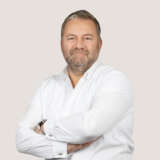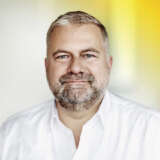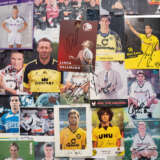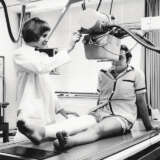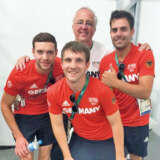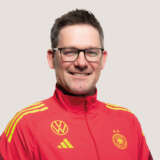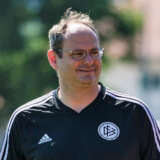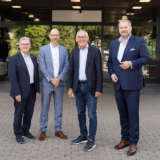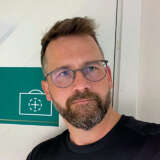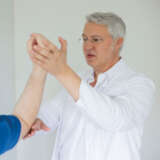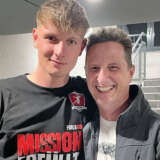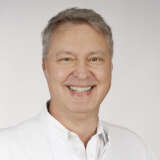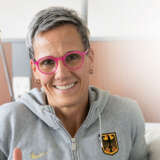The playing field is his second doctor's office
A conversation with Andreas Groll about his work as a team and club doctor
Photo: private
Have article read aloud
Memories from many years of sporting history hang on the walls of the treatment rooms at the MVZ Hellersen medical center. Photos from training courses, team pictures, and other shots show Andreas Groll with young athletes such as Giulia Gwinn and Lena Oberdorf. These pictures were taken at a time when the players were still active in youth sports and their path to the women's national team lay ahead of them. Looking at the pictures, the connection to sports is palpable.
Andreas Groll is Medical Director at the Medical Care Center of the Sportklinik Hellersen. For many years, he has been involved in sports medicine, both with regional clubs such as the Lüdenscheid Lightnings American football team and with teams in the German Football Association. In this interview, he talks about the fascination of his work on the sidelines, the special team spirit, and the responsibility he bears as a team doctor.
“Over time, a close relationship of trust develops and you become part of the players' development. That's exactly what makes this work so special for me.”
Andreas Groll
Medical Director at the Medical Care Center of the Sportklinik Hellersen
Mr. Groll, how did you discover your passion for sports medicine and how did you become the team doctor for the German Football Association?
Andreas Groll: In 2011, my colleague Dr. Bernd Lasarzewski introduced me to the German Football Association (DFB). He had been actively involved in providing medical care for the DFB women's team for many years and brought me on board for this role. For me, this was a great opportunity, which I was very happy to accept. Initially, I looked after the U19 team, but shortly afterwards my focus shifted to the U15 junior women's team. For almost fifteen years now, I have been traveling with this team to training camps, international matches, and tournaments. Over time, a close relationship of trust develops and you become part of the players' development. That's exactly what makes this work so special for me.
What does a typical day as a team doctor at a training session or match day look like?
Andreas Groll: The working day usually begins with a medical check-up. I check the players' fitness levels, look for any acute problems, and talk to them about how they are feeling. During the training course or training camp, I am present at every session, treating minor injuries or infections and taking care of individual fitness management. On match day itself, I am at the sidelines so that I can react immediately in an emergency. But the job goes far beyond purely medical care. Often, I am also simply a contact person when someone has concerns or is unsure about something.
What distinguishes working with young female players from coaching older athletes?
Andreas Groll: Prevention is clearly the top priority for young players. In this age group, you can achieve a great deal by paying attention to movement patterns at an early stage and teaching athletes how to avoid injuries. Examples include the correct landing technique when jumping or stabilizing the leg axis. If this is internalized early on, the risk of more serious injuries later on, such as cruciate ligament tears, is significantly reduced.
“When a player returns to the field with confidence after an injury, it's a very special moment. It's moments like these that make the job so fulfilling for me.”
Andreas Groll
Medical Director at the Medical Care Center of the Sportklinik Hellersen
Photo: Yuliia Perekopaiko/DFB
What do you find appealing about working as a team doctor?
Andreas Groll:
It's the combination of medicine and a passion for sport. You work very closely with the athletes, see how they develop, and help them achieve their goals. When a player returns to the field with confidence after an injury, it's a very special moment. It's moments like these that make the job so fulfilling for me.
In addition to soccer, you also coach regional teams such as the Lüdenscheid Lightnings, HSG Lüdenscheid, and an inline hockey team, the Sauerland Steelbulls. What do you take away from this diversity?
Andreas Groll: Working with regional teams is something very special for me. American football with the Lüdenscheid Lightnings involves enormous physical strain and hard contact. With handball players, the focus is on jumps, throws, and lots of one-on-one battles, which leads to very specific injury patterns. And in inline hockey, the players bring with them completely different movements and risks.
But what makes the work so valuable to me is the closeness to the clubs and the players. I have known many of them for years. I accompany them not only when injuries occur, but also in good times. This creates a relationship of trust that goes far beyond purely medical care. It is important to me to be part of this community and to use my experience to help athletes enjoy their sport in good health.
What role does the Sportklinik Hellersen play in providing care for the teams?
Andreas Groll: A very important one. We can offer athletes highly specialized diagnostics and therapy, and all in the immediate vicinity. Many players go directly to the MVZ at the Sportklinik Hellersen when they have injuries or complaints. There is a high level of trust, and the short distances are a decisive advantage. The interaction between the sports clinic, the team, and medical care is a factor in the success of regional clubs.
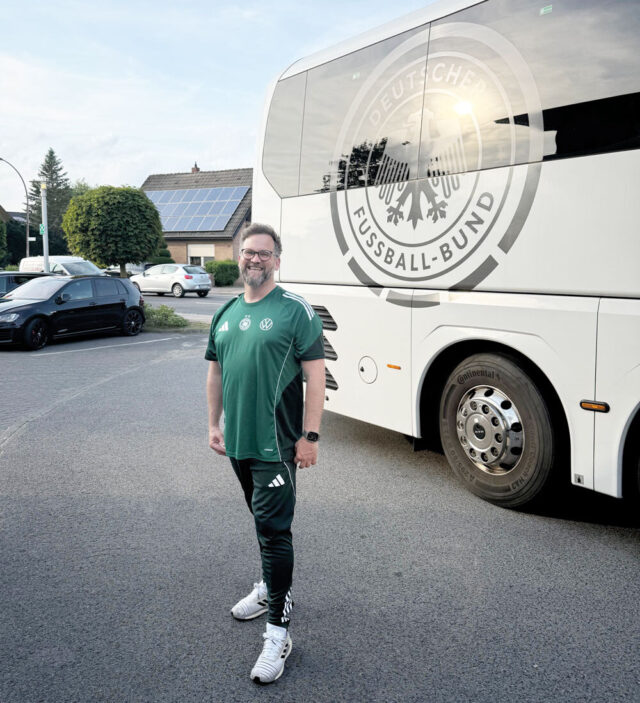
Photo: private
Why is the Olympic bid also of particular importance to the Sportklinik Hellersen?
Andreas Groll: Since its foundation, the Sportklinik Hellersen has been closely associated with competitive sports. Even back then, the aim was to provide athletes with medical care that they could not get elsewhere. This idea continues to shape us today. We are an important point of contact for athletes, whether they need treatment for acute injuries, surgery, rehabilitation, or long-term care. Many of the clinic's team doctors have been supporting teams for years and also contribute their experience to international competitions.
For us, the Olympic bid is therefore more than just a major sporting event. It offers an opportunity to highlight the special role played by the Sportklinik Hellersen and to show how important reliable medical support is for success in competitive sports. It is crucial for athletes to know that they have a clinic at their side that understands them and covers all areas of care at the highest level.



